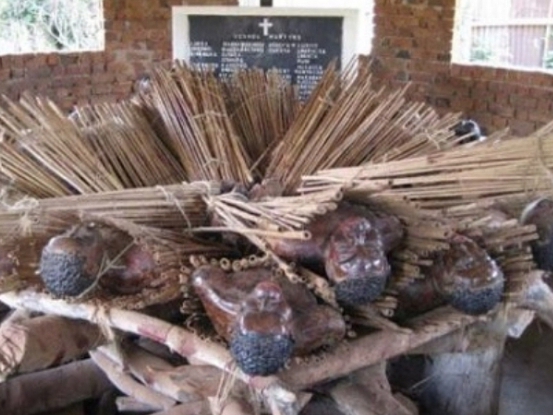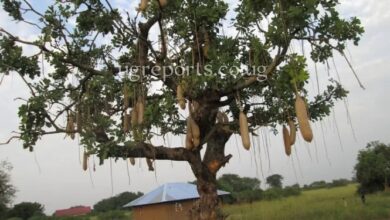Martyrs who came from noble families in Buganda
He held an important position as the royal steward (katikkiro).

Kampala: Among the Uganda Martyrs, some came from noble families in the historical kingdom of Buganda.
Let us highlight a few notable martyrs who held important positions at the Buganda royal court:
- Charles Lwanga: He is perhaps the most well-known martyr. St. Charles Lwanga was a page (attendant) to King Mwanga II. His noble background and influential position made his conversion to Christianity significant. He was executed on June 3, 1886, for refusing to comply with the king’s immoral demands.
- Kizito: St. Kizito was the youngest of the martyrs. He was also a page in the king’s court. His innocence and unwavering faith touched the hearts of many. He was martyred along with St. Charles Lwanga.
- Joseph Mukasa Balikuddembe: Although not of noble birth, St. Joseph Mukasa Balikuddembe held an important position as the royal steward (katikkiro). His execution on November 15, 1885, marked one of the earliest martyrdoms.
- James Buuzabalyawo Kalumba Ssebayigga: St. James Buuzabalyawo was a chief (mugema) in the Buganda kingdom. His conversion to Christianity and subsequent martyrdom left a lasting impact.
- Achilles Kiwanuka: St. Achilles Kiwanuka was a judge (omulamuzi) in the king’s court. His refusal to renounce his faith led to his execution.
- Adolphus Mukasa Ludigo: St. Adolphus Mukasa Ludigo was a soldier (mukajjanga) in the royal army. His courage in the face of death inspired many.
These martyrs, whether of noble birth or not, stood united in their faith and sacrifice.
Why did they face persecution?
The Uganda Martyrs faced persecution for several reasons, primarily related to their Christian faith and their refusal to renounce it.
Here are some specific reasons:
- Religious Conversion: Many of the martyrs were converts to Christianity from traditional African religions or Islam. Their conversion threatened the existing power structures and religious practices in the Buganda kingdom.
- Defiance of King Mwanga II: King Mwanga II, who ruled Buganda during that time, was hostile toward Christianity. He saw it as a threat to his authority and traditional religious practices. The martyrs’ refusal to participate in rituals honoring traditional gods angered the king.
- Refusal to Engage in Immoral Acts: King Mwanga II demanded that the young Christian converts participate in immoral acts, including sexual exploitation. The martyrs, guided by their faith, resisted these demands, which further infuriated the king.
- Influence of European Missionaries: European missionaries had arrived in Buganda and were actively spreading Christianity. King Mwanga II perceived this as a challenge to his rule and authority. The martyrs’ association with the missionaries made them targets.
- Political Tensions: The conflict between traditional African customs and the influence of European colonial powers created political tensions. The martyrs’ allegiance to Christianity aligned them with the European missionaries, leading to their persecution.
- Examples Made of the Martyrs: King Mwanga II wanted to make examples of the martyrs to discourage others from converting to Christianity. Their executions were meant to instill fear and suppress the spread of the new faith.
Despite the persecution, the Uganda Martyrs remained steadfast in their beliefs, choosing martyrdom over renouncing their faith. Their sacrifice has left a lasting impact on the Christian community and serves as a powerful testament to unwavering devotion.
How their martyrdom impacted local communities
The martyrdom of Uganda Martyrs had a profound impact on local communities in Buganda (now part of Uganda).
Let’s explore some of the ways their sacrifice influenced the people:
- Strengthening of Faith: The martyrdom of these brave individuals strengthened the faith of existing Christians and inspired many others to convert. Witnessing their unwavering commitment to Christianity, even in the face of death, motivated local communities to embrace the Christian faith more fervently.
- Unity and Solidarity: The Uganda Martyrs came from diverse backgrounds, both Catholic and Anglican. Their shared fate brought unity among Christians, transcending denominational differences. Local communities saw the power of solidarity in the face of persecution.
- Resistance Against Oppression: The martyrs’ refusal to renounce their faith challenged the oppressive regime of Kabaka Mwanga II. Their courage demonstrated that faith was more valuable than life itself. This resistance against tyranny resonated with local communities and fueled a spirit of defiance.
- Legacy of Holiness: The Uganda Martyrs are revered as saints, and their memory is celebrated annually on Martyrs’ Day (June 3rd). Their legacy of holiness continues to inspire Ugandans to live virtuous lives and uphold their faith.
- Christianization of Buganda: The financial support from European governments following the martyrdom facilitated the establishment of churches and schools in Buganda. This contributed to the spread of Christianity and education, shaping the cultural landscape of the region.
Do you have an advertisement or article you want to publish? Mail us at theugreports@gmail.com or WhatsApp +256757022363.






